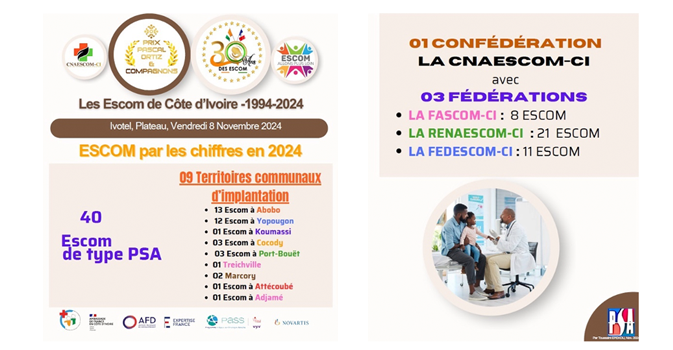In November, the Ministry of Health, Public Hygiene and Universal Health Coverage, the Senate of Côte d’Ivoire, community associations, health care workers and patients celebrated 30 years of their resilient primary health care model. Forty community health centres in Abidjan are moving the country towards universal health coverage.
At the beginning of November 2024 in Abidjan, Côte d’Ivoire, authorities from the Ministry of Health, Public Hygiene and Universal Health Coverage (MOH), the Senate of Côte d’Ivoire, community associations, health care workers and patients celebrated their resilient primary health care model. The 40 community health centres make key contributions to primary health care in Abidjan (the economic capital of Côte d’Ivoire) and are essential to moving the country forwards on its road to universal health coverage.
At the end of the 1990s, an initiative in public-private partnership between the Ivorian MOH and urban communities began in Abidjan. The concept was based on the Bamako Initiative, launched a decade earlier. In Mali, the centres de santé communautaires (community health centres) (CS-com) were also started at about the same time. In Côte d’Ivoire, the French government and Projet Santé Abidjan supported construction and rehabilitation of certain buildings plus an initial six months of operational costs and provided technical assistance for the original 13 centres. Investment funding was subsequently provided both by donors (including Belgian foreign assistance) and the government budget (World Bank Group loans). Running costs are now covered by a variety of sources, and each establishment has managed the mix that works for it. The expansion of this model, from 13 centres in 2002 to 40 in 2024, covering the period of civil strife, is a testament to their resilience and sustainability.
After thirty years of implementation, it is clear that the experience in Côte d’Ivoire has been successful. In 2002, 13 Formations sanitaires urbaines communautaires (urban community health centres) (FSU-com) were in operation under private nonprofit statute, combined with public service agreements with the MOH. In 2024, 40 Établissements communautaires (community health facilities) (ES-com) provide primary health care (PHC), and more, to their communities.
The ES-com appear to have been able to reach a level of professionalization and sustainability, both in quality of care and in financial administration. This achievement may be due to the initial investment, provision of extensive training to administrators and continuation of support from the MOH. Each establishment has its own personality and community base, and support for each centre varies. Some benefit, for example, from human resources for health from the MOH, payments for utilities or other running costs from local elected authorities (city hall). Further, ES-com are planned in Côte d’Ivoire, supported in part as an element of a debt reduction and development contract between France and Côte d’Ivoire.


